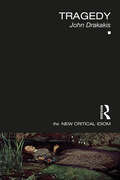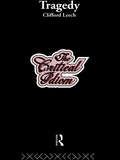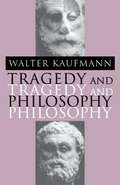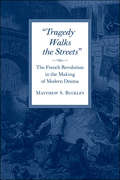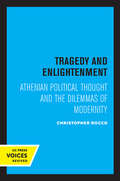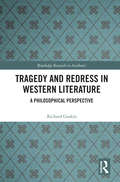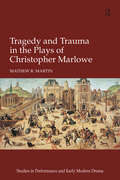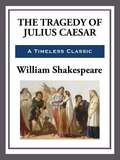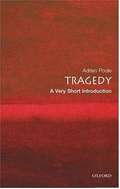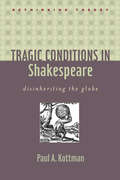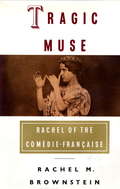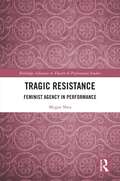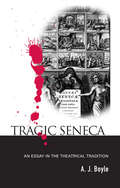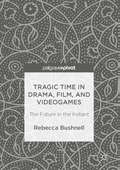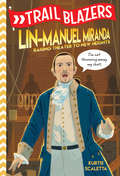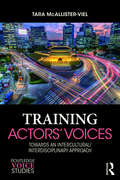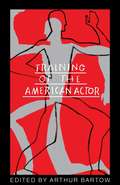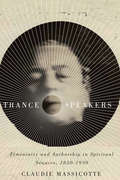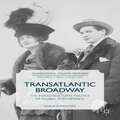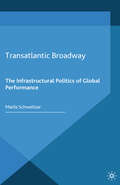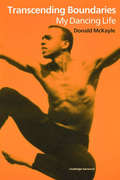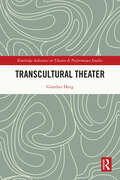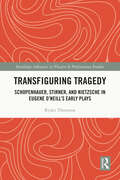- Table View
- List View
Tragedy (The New Critical Idiom)
by John DrakakisTragedy is one of the oldest and most resilient forms of narrative. Considering texts from ancient Greece to the present day, this comprehensive introduction shows how tragedy has been re-imagined and redefined throughout Western cultural history. Tragedy offers a concise history of tragedy tracing its evolution through key plays, prose, poetry and philosophical dimensions. John Drakakis examines a wealth of popular plays, including works from the ancient Greeks, Shakespeare, Bertolt Brecht, Sarah Kane and Tom Stoppard. He also considers the rewriting and appropriating of ancient drama though a wide range of authors, such as Chaucer, George Eliot, Ted Hughes and Colm Tóibín. Drakakis also demystifies complex philosophical interpretations of tragedy, including those of Hegel, Kierkegaard, Nietzsche and Benjamin. This accessible resource is an invaluable guide for anyone studying tragedy in literature or theatre studies.
Tragedy (The\critical Idiom Reissued Ser. #1)
by Clifford LeechProfessor Leech considers the significance of the term ‘Tragedy’ as it has been used from classical times to the present day. He gives examples of tragic writing from a wide variety of dramatic literatures and relates theoretical writings on tragedy and the tragedies that have been contemporaneous with them. Free reference is made to critics from Aristotle to these of the present. Special stress is laid on the tragedies of the Greeks, of Renaissance writers and of our immediate contemporaries, notably Harold Pinter and Tom Stoppard. There is also discussion of tragic writing in the modern novel.
Tragedy And Philosophy
by Walter KaufmannA critical re-examination of the views of Plato, Aristotle, Hegel and Nietzsche on tragedy. Ancient Greek tragedy is revealed as surprisingly modern and experimental, while such concepts as mimesis, catharsis, hubris and the tragic collision are discussed from different perspectives.
Tragedy Walks the Streets: The French Revolution in the Making of Modern Drama
by Matthew S. BuckleyTragedy Walks the Streets challenges the conventional understanding that the evolution of European drama effectively came to a halt during France's Revolutionary era. In this interdisciplinary history on the emergence of modern drama in European culture, Matthew S. Buckley contends that the political theatricality of the Revolution tested and forced the evolution of dramatic forms, supplanting the theater itself as the primary stage of formal development. Drawing on a wide range of texts and images, he demonstrates how the social and political enlistment of dramatic theatricality inflected rising social and political tensions in pre-Revolutionary France, shaped French Revolutionary political culture, conditioned British political and cultural responses to the Revolution, and served as the impetus for Büchner’s radical formal innovations of the 1830s. Setting aside traditional boundaries of literary scholarship, Buckley pursues instead a history of dramatic form that encompasses the full range of dramatic activity in the changing cultural life of the late eighteenth and early nineteenth century, including art, architecture, journalism, political performance, and social behavior. Surveying this expanded field of inquiry, Buckley weaves together a coherent formal genealogy of the drama during this period and offers a new, more continuous generic history of modern drama in its first and most turbulent phase of development.
Tragedy and Enlightenment: Athenian Political Thought and the Dilemmas of Modernity (Classics and Contemporary Thought #4)
by Christopher RoccoThis title is part of UC Press's Voices Revived program, which commemorates University of California Press’s mission to seek out and cultivate the brightest minds and give them voice, reach, and impact. Drawing on a backlist dating to 1893, Voices Revived makes high-quality, peer-reviewed scholarship accessible once again using print-on-demand technology. This title was originally published in 1997.
Tragedy and Redress in Western Literature: A Philosophical Perspective (Routledge Research in Aesthetics)
by Richard GaskinThis book offers a unique interpretation of tragic literature in the Western tradition, deploying the method and style of Analytic philosophy. Richard Gaskin argues that tragic literature seeks to offer moral and linguistic redress (compensation) for suffering. Moral redress involves the balancing of a protagonist’s suffering with guilt (and vice versa): Gaskin contends that, to a much greater extent than has been recognized by recent critics, traditional tragedy represents suffering as incurred by avoidable and culpable mistakes of a cognitive nature. Moral redress operates in the first instance at the level of the individual agent. Linguistic redress, by contrast, operates at a higher level of generality, namely at the level of the community: its fundamental motor is the sheer expressibility of suffering in words. Against many writers on tragedy, Gaskin argues that language is competent to express pain and suffering, and that tragic literature has that expression as one its principal purposes. The definition of tragic literature in this book is expanded to include more than stage drama: the treatment stretches from the Classical and Medieval periods through to the early twentieth century. There is a special focus on Sophocles, but Gaskin takes account of most other major tragic authors in the European tradition, including Homer, Aeschylus, Euripides, Virgil, Seneca, Chaucer, Marlowe, Shakespeare, Corneille, Racine, Lessing, Goethe, Schiller, Kleist, Büchner, Ibsen, Hardy, Kafka, and Mann; lesser-known areas, such as Renaissance neo-Latin tragedy, are also covered. Among theorists of tragedy, Gaskin concentrates on Aristotle and Bradley; but the contributions of numerous contemporary commentators are also assessed. Tragedy and Redress in Western Literature: A Philosophical Perspective offers a new and genuinely interdisciplinary perspective on tragedy that will be of considerable interest both to philosophers of literature and to literary critics.
Tragedy and Trauma in the Plays of Christopher Marlowe (Studies in Performance and Early Modern Drama)
by Mathew R. MartinContending that criticism of Marlowe’s plays has been limited by humanist conceptions of tragedy, this book engages with trauma theory, especially psychoanalytic trauma theory, to offer a fresh critical perspective within which to make sense of the tension in Marlowe’s plays between the tragic and the traumatic. The author argues that tragedies are trauma narratives, narratives of wounding; however, in Marlowe’s plays, a traumatic aesthetics disrupts the closure that tragedy seeks to enact. Martin’s fresh reading of Massacre at Paris, which is often dismissed by critics as a bad tragedy, presents the play as deliberately breaking the conventions of the tragic genre in order to enact a traumatic aesthetics that pulls its audience into one of the early modern period’s most notorious collective traumatic events, the massacre of French Huguenots in Paris in 1572. The chapters on Marlowe’s six other plays similarly argue that throughout Marlowe’s drama tragedy is held in tension with-and disrupted by-the aesthetics of trauma.
Tragedy in Ovid
by Dan CurleyOvid is today best known for his grand epic, Metamorphoses, and elegiac works like the Ars Amatoria and Heroides. Yet he also wrote a Medea, now unfortunately lost. This play kindled in him a lifelong interest in the genre of tragedy, which informed his later poetry and enabled him to continue his career as a tragedian - if only on the page instead of the stage. This book surveys tragic characters, motifs and modalities in the Heroides and the Metamorphoses. In writing love letters, Ovid's heroines and heroes display their suffering in an epistolary theater. In telling transformation stories, Ovid offers an exploded view of the traditional theater, although his characters never stray too far from their dramatic origins. Both works constitute an intratextual network of tragic stories that anticipate the theatrical excesses of Seneca and reflect the all-encompassing spirit of Roman imperium.
Tragedy of Julius Caesar
by William ShakespeareA great tragedy based on Plutarch's account of the lives of Brutus, Julius Caesar, and Mark Antony. Evil plotting, ringing oratory, high tragedy occur with Shakespeare's incomparable insight and dramatic power.
Tragedy: A Very Short Introduction
by Adrian PooleTo your local anchorperson, the word "tragedy" brings to mind an accidental fire at a low-income apartment block, the horrors of a natural disaster, or atrocities occurring in distant lands. To a classicist however, the word brings to mind the masterpieces of Sophocles, Shakespeare, and Racine; beautiful dramas featuring romanticized torment. What has tragedy been made to mean by dramatists, storytellers, philosophers, politicians, and journalists over the last two and a half millennia? Why do we still read, re-write, and stage these old plays? This lively and engaging work presents an entirely unique approach which shows the relevance of tragedy to today's world, and extends beyond drama and literature into visual art and everyday experience. Addressing questions about belief, blame, mourning, revenge, pain, and irony, noted scholar Adrian Poole demonstrates the age-old significance of our attempts to make sense of terrible suffering.
Tragic Conditions in Shakespeare: Disinheriting the Globe (Rethinking Theory)
by Paul A. KottmanPaul A. Kottman offers a new and compelling understanding of tragedy as seen in four of Shakespeare’s mature plays—As You Like It, Hamlet, King Lear, and The Tempest. The author pushes beyond traditional ways of thinking about tragedy, framing his readings with simple questions that have been missing from scholarship of the past generation: Are we still moved by Shakespeare, and why? Kottman throws into question the inheritability of human relationships by showing how the bonds upon which we depend for meaning and worth can be dissolved. According to Kottman, the lives of Shakespeare's protagonists are conditioned by social bonds—kinship ties, civic relations, economic dependencies, political allegiances—that unravel irreparably. This breakdown means they can neither inherit nor bequeath a livable or desirable form of sociality. Orlando and Rosalind inherit nothing "but growth itself" before becoming refugees in the Forest of Arden; Hamlet is disinherited not only by Claudius’s election but by the sheer vacuity of the activities that remain open to him; Lear’s disinheritance of Cordelia bequeaths a series of events that finally leave the social sphere itself forsaken of heirs and forbearers alike. Firmly rooted in the philosophical tradition of reading Shakespeare, this bold work is the first sustained interpretation of Shakespearean tragedy since Stanley Cavell’s work on skepticism and A. C. Bradley’s century-old Shakespearean Tragedy.
Tragic Muse
by Rachel BrownsteinThe great nineteenth-century tragedienne known simply as Rachel was the first dramatic actress to achieve international fame. Composing her own persona with the same brilliance and passion she demonstrated on stage, she virtually invented the role of "star. " Rumors of her extravagant life offstage delighted the audiences who flocked to theaters in Boston and Paris, London and Moscow, to see her perform in the tragedies of Racine and Corneille. InTragic Muse, Rachel M. Brownstein reveals the life ofla grande Racheland explores—at the boundary of biography, fiction, and cultural history—the connections between this self-dramatizing woman and her image. Born to itinerant Jewish peddlers in 1821, Rachel arrived on the Paris stage at the age of fifteen. She became both a symbol of her culture’s highest art and a clue to its values and obsessions. Fascinated with all things Napoleonic, she was the mother of Napoleon’s grandson and the lover of many men connected to the emperor. Her story—the rise from humble beginnings to queen of the French state theater—echoes and parodies Napoleon’s own. She decisively controlled her career, her time, and finances despite the actions and claims of managers, suitors, and lovers. A woman of exceptional charisma, Rachel embodied contradiction and paradox. She captured the attention of her time and was memorialized in the works of Matthew Arnold, Charlotte Brontë, George Eliot, and Henry James. Richly illustrated with portraits, photographs, and caricatures,Tragic Musecombines brilliant literary analysis and exceptional historical research. With great skill and acuity, Rachel M. Brownstein presents Rachel—her brief intense life and the image that was both self-fashioned and, outliving her, fashioned by others. First published by Knopf (1993), this book will attract a broad audience interested in matters as wide ranging as the construction of character, the cult of celebrity, women’s lives, and Jewish history. It will also be of enduring interest to readers concerned with nineteenth-century French culture, history, literature, theater, and Romanticism. Tragic Musewon the 1993 George Freedley Award presented by the Theater Library Association.
Tragic Pathos
by Dana Lacourse MunteanuScholars have often focused on understanding Aristotle's poetic theory, and particularly the concept of catharsis in the Poetics, as a response to Plato's critique of pity in the Republic. However, this book shows that, while Greek thinkers all acknowledge pity and some form of fear as responses to tragedy, each assumes a different purpose for the two emotions and mode of presentation and, to a degree, understanding of them. This book reassesses expressions of the emotions within different tragedies and explores emotional responses to and discussions of the tragedies by contemporary philosophers, providing insights into the ethical and social implications of the emotions.
Tragic Resistance: Feminist Agency in Performance (Routledge Advances in Theatre & Performance Studies)
by Megan SheaTragic Resistance analyzes playwrights, directors, and performers who shatter gender norms to gain agency within the patriarchal institutions restricting them.The artists in this book work against the tragic narratives that would otherwise constrict them: the tragedy of Antigone unmade by Judith Malina, the history of "The Venus Hottentot" pulled into the present in Suzan-Lori Parks's Venus, the narrative of the rape "victim" eschewed in Emma Sulkowicz's performances, the story of brides jilted by the homophobic state government in the case of Annie Sprinkle and Beth Stephens, the tragedy of Anna Nicole as told by Margaret Cho, and the reclamation of the female body from traditional hip hop by Nicki Minaj. All these performers and performances subvert traditional notions of gendered roles that people should or could hold.This book examines the nature of these performances to interrogate how theatrical and performative resistance works and why performance might be a vehicle for altering patriarchal structures that withhold agency from women and trans/genderqueer+ people.
Tragic Seneca: An Essay in the Theatrical Tradition
by A. J. BoyleTragic Seneca undertakes a radical re-evaluation of Seneca's plays, their relationship to Roman imperial culture and their instrumental role in the evolution of the European theatrical tradition.Following an introduction on the history of the Roman theatre, the book provides a dramatic and cultural critique of the whole of Seneca's corpus, analysing the declamatory form of the plays, their rhetoric, interiority, stagecraft and spectacle, dramatic, ideological and moral structure and their overt theatricality. Each of Seneca's plays is examined in detail, locating the force of Senecan drama not only in the moral complexity of the texts and their representations of power, violence, history, suffering and the self, but the semiotic interplay of text, tradition and culture.The later chapters focus on Seneca's influence on Italian, English and French drama of the Renaissance. A.J. Boyle argues that tragedians such as Cinthio, Kyd, Marlowe, Shakespeare, Webster, Corneille, and Racine owe a debt to Seneca that goes beyond allusion, dramatic form and the treatment of tyranny and revenge to the development of the tragic sensibility and the metatheatrical mind.Tragic Seneca attempts to restore Seneca to a central position in the European literary tradition. It will provide readers and directors of Seneca's plays with the essential critical guide to their intellectual, cultural and dramatic complexity.
Tragic Time in Drama, Film, and Videogames
by Rebecca BushnellThis book explores how classical and Shakespearean tragedy has shaped the temporality of crisis on the stage and in time-travel films and videogames. In turn, it uncovers how performance and new media can challenge common assumptions about tragic causality and fate. Traditional tragedies may present us with a present when a calamity is staged, a decisive moment in which everything changes. However, modern performance, adaptation and new media can question the premises of that kind of present crisis and its fatality. By offering replays or alternative endings, experimental theatre, adaptation, time travel films and videogames reinvent the tragic experience of irreversible present time. This book offers the reader a fresh understanding of tragic character and agency through these new media's exposure of the genre's deep structure.
Trailblazers: Raising Theater to New Heights (Trailblazers)
by Kurtis ScalettaMeet history's trailblazers! Get inspired by the true story of the creator of the Broadway blockbuster, Hamilton! A biography series for kids who loved Who Was? and are ready for the next level.On July 19, 2015,Lin-Manuel Miranda stepped out on the Broadway stage in Hamilton. His show about Alexander Hamilton, featuring hip hop, R&B, and other music styles, became one of the most successful musicals of all time! Find out how the boy who loved performing blazed a trail in theater!Trailblazers celebrates the lives of amazing pioneers, past and present, from all over the world. What kind of trail will you blaze?Don't miss the other Trailblazers biographies, including Beyoncé, J. K. Rowling, and Simone Biles.
Training Actors' Voices: Towards an Intercultural/Interdisciplinary Approach (Routledge Voice Studies)
by Tara McAllister-VielContemporary actor training in the US and UK has become increasingly multicultural and multilinguistic. Border-crossing, cross-cultural exchange in contemporary theatre practices, and the rise of the intercultural actor has meant that actor training today has been shaped by multiple modes of training and differing worldviews. How might mainstream Anglo-American voice training for actors address the needs of students who bring multiple worldviews into the training studio? When several vocal training traditions are learned simultaneously, how does this shift the way actors think, talk, and perform? How does this change the way actors understand what a voice is? What it can/should do? How it can/should do it? Using adaptations of a traditional Korean vocal art, p’ansori, with adaptations of the "natural" or "free" voice approach, Tara McAllister-Viel offers an alternative approach to training actors’ voices by (re)considering the materials of training: breath, sound, "presence," and text. This work contributes to ongoing discussions about the future of voice pedagogy in theatre, for those practitioners and scholars interested in performance studies, ethnomusicology, voice studies, and intercultural theories and practices.
Training of the American Actor
by Arthur BartowSuccessful acting must reflect a society's current beliefs. The men and women who developed each new technique were convinced that previous methods were not equal to the full challenges of their time and place, and the techniques in this book have been adapted to current needs in order to continue to be successful methods for training actors. The actor's journey is an individual one, and the actor seeks a form, or a variety of forms, of training that will assist in unlocking his own creative gifts of expression.--from the introductionThe first comprehensive survey and study of the major techniques developed by and for the American actor over the past 60 years. Each of the 10 disciplines included is described in detail by one of today's foremost practitioners.Presented in this volume are:* Lee Strasberg's Method by Anna Strasberg, Lee's former student, widow, and current director of The Lee Strasberg Theatre Institute * Stella Adler Technique by Tom Oppenheim, Stella's grandson and artistic director of the Stella Adler Institute in New York * Sanford Meisner Technique by Victoria Hart, director of the Meisner Extension at New York University * Michael Chekhov Technique and The Mask by Per Brahe, a Danish teacher inspired by Balinese dance and introduced to the Chekhov technique in Russia * Uta Hagen Technique by Carol Rosenfeld, who taught under Hagen's tutelage at the Herbert Berghof (HB) Studio * Physical Acting Inspired by Grotowski by Stephen Wangh, who studied with Jerzy Grotowski himself * The Viewpoints by Mary Overlie, the creator of Viewpoints theory * Practical Aesthetics by Robert Bella of the David Mamet-inspired Atlantic Theatre Company school * Interdisciplinary Training by Fritz Ertl, who teaches at the Playwrights Horizons Theatre School * Neoclassical Training by Louis Scheeder, director of the Classical Studio of New York UniversityArthur Bartow is the artistic director of the Department of Drama at New York University's Tisch School of the Arts. A former associate director of Theatre Communications Group, he is the author of the landmark book The Director's Voice.
Trance Speakers: Femininity and Authorship in Spiritual Séances, 1850-1930
by Claudie MassicotteFew people know that Susanna Moodie participated in spiritual séances with her husband, Dunbar, and her sister, Catharine Parr Traill. Moodie, like many other women, found in her communications with the departed an important space to question her commitment to authorship and her understanding of femininity. Retracing the history of possession and mediumship among women following the emergence of spiritualism in mid-nineteenth-century Canada – and unearthing a vast collection of archival documents and photographs from séances – Claudie Massicotte pinpoints spiritualism as a site of conflict and gender struggle and redefines modern understandings of female agency. Trance Speakers offers a new feminist and psychoanalytical approach to the religious and creative practice of trance, arguing that by providing women with a voice for their conscious and unconscious desires, this phenomenon helped them resolve their inner struggles in a society that sought to confine their lives. Drawing attention to the fascinating history of spiritualism and its persistent appeal to women, Massicotte makes a strong case for moving this practice out of the margins of the past. A compelling new reading of spiritual possession as a response to conflicting interpretations of authorship, agency, and gender, Trance Speakers shines a much-needed light on women’s religious practices and on the history of spiritualist traditions and travels across North America and Europe.
Transatlantic Broadway
by Marlis SchweitzerTransatlantic Broadway traces the infrastructural networks and technological advances that supported the globalization of popular entertainment in the pre-World War I period, with a specific focus on the production and performance of Broadway as physical space, dream factory, and glorious machine. Inspired by post-humanist scholarship, this book pays heed to the non-human entities and the backgrounded or disappeared human laborers who participated in the transnational expansion of theatre networks. In particular, it examines the transnational performances of ocean liners, piers, telegraph cables, telegrams, typewriters, office spaces, newspapers, and postcards and asks how these objects, as participants in a series of complicated networks, transformed the machinery of US theatre as well as the everyday practices of those who produced and consumed it. In so doing, it identifies surprising connections between the most mundane of actions - typing a letter, turning over a postcard - and the most extraordinary - firing a torpedo, declaring war.
Transatlantic Broadway: The Infrastructural Politics of Global Performance (Transnational Theatre Histories)
by M. SchweitzerTransatlantic Broadway traces the infrastructural networks and technological advances that supported the globalization of popular entertainment in the pre-World War I period, with a specific focus on the production and performance of Broadway as physical space, dream factory, and glorious machine.
Transcending Boundaries: My Dancing Life (Choreography And Dance Studies #Vol. 22)
by Donald McKayle"First Published in 2002, Routledge is an imprint of Taylor & Francis, an informa company."
Transcultural Theater (Routledge Advances in Theatre & Performance Studies)
by Günther HeegTranscultural Theater outlines the idea of a transcultural theater as enabling an approximation to and an interaction with the foreign and the alien. In consideration of the allure of fundamentalist and populist movements that promote the development and practices of xenophobia worldwide, this book makes a powerful plea for the art of theater as a medium of conviviality with (the) foreign(er) that should not be underestimated. This study contributes to transcultural experience, artistic practice, and education in the medium of theater. The book’s investigation extends far into space and time and pays particular attention to the relationship between aesthetic experience, artistic practice, and academic representation. This book is for scholars and students as well as for all those working in the cultural field, especially in the field of cultural transfer.
Transfiguring Tragedy: Schopenhauer, Stirner, and Nietzsche in Eugene O’Neill’s Early Plays (ISSN)
by Ryder ThorntonThis book demonstrates Eugene O’Neill’s use of philosophy in the early period of his work and provides analyses of selected works from that era, concluding with The Hairy Ape, completed in 1921, as an illustration of the mastery he had achieved in dramatizing key concepts of philosophy.Analyses of one-act and full-length plays from 1913 to 1921 reveal the influence of the three philosophers and establish that O’Neill was fundamentally a philosophic playwright, even from his earliest dramatic sketches. Specific concepts from Schopenhauer, Stirner, and Nietzsche went into O’Neill’s shaping of character arcs, dramatic circumstances, symbology, and theme. Among them are Schopenhauer’s concept of will and representation, Stirner’s notion of possession, and Nietzsche’s principle of the Apollonian–Dionysian duality. These ideas were foundational to O’Neill’s construction of tragic irony apparent in his early period plays. The critical concepts of these three philosophers are the major pathways in this study. However, such an approach inevitably reveals other layers of spiritual influence, such as Catholicism and Eastern philosophy, which are touched on in these analyses.This book is a much-needed introduction to philosophic concepts in Eugene O’Neill’s early work and would be of great interest to students and scholars in theatre studies and philosophy.
